Scott Adams's Blog, page 299
February 28, 2015
Skeptics Say Science Has No Obligation to Communicate Clearly
I was just alerted to an odd podcast called The Skeptics Guide to the Universe in which a panel of unpleasant people take things out of context and get angry about them. Apparently I was in their cross-hairs on Episode 502, about 16 minutes in. I can’t link to it directly but the main page is here.
Keep in mind that this is a panel of rational, science-loving skeptics. That’s what makes observing the irrationality extra fun. The psychology of it is fascinating. I’ll walk you through it.
If you feel bored enough to listen to the podcast, you’ll first hear a bunch of angry skeptics AGREEING with what I wrote in this post while pretending they are DISAGREEING with it by adding an angry and dismissive tone to it. As a hobbyist hypnotist, I recognize that as a “tell” for cognitive dissonance that will likely worsen.
And it does.
At one point in the podcast they start imagining that I wrote about a conspiracy theory in which science and the media intentionally mislead the public. (Remember, these are rational, scientific, skeptical people. And they were ready to believe I wrote of a grand conspiracy between science and the media to mislead the public for…fun? Money? The motive was left off the conspiracy theory.)
How do super-rational people turn into chimps in under a minute? The fields of hypnosis and psychology explain it. This is quite normal. You need the following set-up, which they had:
Bias: The Internet has a persistent rumor that I don’t believe in science because I don’t understand how it works. The rumor started the usual way, with some acts of outragism in which stuff I wrote was taken out of context so I could be held up as an example of a dumb Creationists and (ironically) crucified for the benefit of science. Since I haven’t believed in God since I was eleven, the claim that I am a creationist supporter feels odd to me. But hey, this is the Internet.
Violation of the Bias: To generate cognitive dissonance you need a violation of bias. I provided that trigger when I wrote a critique of how science has communicated to the public, and how the media makes things worse. The skeptical panelists agreed with every point I made, and clearly said so.
Now the skeptics had a dilemma. How could their opinions be identical to the opinions of the guy who famously (they think) holds exactly the OPPOSITE opinion? Opposites can’t be the same.
So the brain punts. It cooks up a delusion to patch the break in mental cohesion. It makes the discomfort of misunderstanding go away.
My rational readers will be quick to point out that I might be the one experiencing cognitive dissonance, and I accept that possibility. I wouldn’t even be surprised if it turned out to be the case.
Shall we test it?
And by we I mean you. If I’m in the grips of my own delusions, new data probably won’t change things for me. But you are relatively uninterested in this situation so your biases are probably less hardened than mine. See what you think.
I offer this unscientific test of who is experiencing the bigger delusions — the angry skeptics or me.If you were one of the skeptics on the panel, please paraphrase in your own words (in the comments below) what you think I said that is different from what you believe. And I will confirm whether your summary of my words is accurate or not. To keep things simple, please put my alleged point of contention in one sentence, as in:"You said the moon is made of cheese!"
I predict there will be zero points of disagreement, at least about science. And I hope you find it interesting that an entire panel of skeptics thought I said a number of disagreeable things.
Also, please let me know if my title to this post seems fair based on the podcast. It sounded to me as if they are saying science doesn’t have an obligation to communicate to the public. I agree with that, as there is technically no legal or professional obligation to do so. But if letting the media do the talking for science is leading to the end of the civilization (climate change, the Singularity, etc.) I think I would try to step up my game in communicating. But that’s just me.
I wonder if they realize I’m trying to help.
Scott
————————————————————————————————————————-
Check out the latest news on holograms and teleportation on Paul Worthington’s Top Tech Blog.See Tamra Reid’s Berkeley Start-up Review blog for the most interesting start-ups coming out of the Berkeley start-up ecosystem (second only to Stanford in number.)
And don’t miss Vivian Giang’s post on the dangers of smiling :-)
—————————————————————————————————————————
My book on success: “…the best business book I have read in the last decade.” (Amazon 5-star review Feb 26, 2015)
February 27, 2015
The Two Biggest Problems in the United States are Food and Marriage
Here’s the problem with food:
Broccoli is food.
Cake is food.
Those two things are not the same. Broccoli is good for your body and cake is not. When you have two items that are almost opposites, they probably should not have the same name. Would it make sense to have only one word to cover both criminal and victim?
I know you hate big government, so imagine what follows as a thought experiment. Imagine the government passes a law to label all edibles as one of these two categories:
1. Food, or2. Entertainment (cake, french fries, junk food, candy)
As a parent, it is hard to tell a kid to avoid unhealthy food. My hypothesis is that it would be far easier for both kids and adults to avoid edibles labeled “entertainment.” This idea is inspired by my hypnosis background and my hobbyist understanding of persuasion and psychology.
In the short term, the day after you change the names of things, nothing much would be different. But over time, the different labels would sink into people’s minds and become a substitute for rational thought. In twenty years the idea of turning to “entertainment” because you are hungry will feel silly.
This sort of label change would destroy the fast-food and traditional supermarket industry in about five years. Today a busy parent will take a kid to McDonald’s because it feels as if the convenience outweighs the cost. But I guarantee that if the sign on the door said “entertainment” instead of some suggestion of “food,” every parent in my neighborhood would feel shamed to be seen there. The peer pressure would be overwhelming. If you doubt that, try telling your neighbor you aren’t into recycling and watch the look of horror on his face as he judges you.
Humans are not rational creatures. Words rewire our brains and turn us into different creatures. Normally we have some control over which words are influencing us, and that is a good thing. At the moment, we are being victimized by the word “food.” Realistically, we won’t be able do an exorcism on that word and remove the “entertainment” part because the food industry uses Congress as finger-puppets. That’s why this is just a thought experiment.
But if it could happen….Imagine a world in which most people are eating healthy food. Suddenly everyone looks better to each other, so our social lives and our sex lives are enlivened. Our health expenses drop, and the quality of our lives zooms. I can tell you from experience that when I evolved from a bad diet to a good one, nearly every part of my life improved. And the difference is huge. My body at age 57 is far superior to my body in my twenties primarily because of an improved diet. And I thought I was in good shape in my twenties. Diet isn’t a small thing in your life. It is the main thing, because it shapes your success in every other realm, from sex to business.
Now let’s talk about marriage.Divorce is one of the most expensive, horrible, and wasteful things a person can experience. It is terrible for the kids, terrible for finances, good for lawyers, bad for employers, etc. Half of marriages end in divorce. And those people typically remarry and either divorce again or, all too often, live unhappily ever after. The entire process is insanely inefficient.
Unfortunately, in 2015, marriage is probably the best system we have for raising kids. But as a thought experiment, imagine that the government removes all laws favoring marriage. You get no tax breaks, no nothing. And instead the government encourages people to set up alternative social systems that solve the problems of divorce.
How do you solve the divorce problem? Ask any economist. It is quite easy. I’ll give you a solution in one word: diversification.
In marriage, if something bad happens to one person, or one person becomes a jerk, the system breaks. Any engineer will tell you that is a poorly designed system. But if, for example, you had a small tribe of people cooperating for mutual interest, a bad day for one of them wouldn’t be a death blow for the tribe. If your love interest hates you today, you have three others on call. If you get sick and need childcare, there are ten people ready to help.
Don’t have time to exercise because of driving kids around? That’s no problem if your tribe has some designated after-school drivers. Is it hard to buy and prepare healthy food? No problem if some members of your tribe are great cooks and like cooking in bulk.
I won’t design a full alternative to marriage here because people are different and one solution does not fit all. The main idea is that marriage is perhaps the biggest economic problem in the country that isn’t food-related. Marriage made sense in old-timey days. But with the help of the Internet it would make more sense for people to organize around what works instead of what we know does not.
You will be tempted to point out in the comments that hippy communes didn’t catch on. I’m not talking about poorly-engineered hippy communes. That’s like comparing a Model-T to a Tesla. I think that with some creative thinking, and maybe some experimenting, society could develop modern alternatives to marriage that remove the divorce problem.
I hear whispers that these sorts of arrangements are already happening, but because non-monogamy is shamed, you don’t hear much about it. Marriage will go away eventually, as all bad systems do. Single people recently became the majority in this country. Can we speed it up?
Scott
————————————————————————————————————————-
Check out the latest news on holograms and teleportation on Paul Worthington’s Top Tech Blog.See Tamra Reid’s Berkeley Start-up Review blog for the most interesting start-ups coming out of the Berkeley start-up ecosystem (second only to Stanford in number.)
And don’t miss Vivian Giang’s post on the dangers of smiling :-)
—————————————————————————————————————————
My book on success: “…the best business book I have read in the last decade.” (Amazon 5-star review Feb 26, 2015)
February 26, 2015
Nobel Prize Winning Physicist Accidentally Agrees With Idiot
When you have a minute, and some headphones, this recent TED talk by Nobel Prize winner George Smoot on the high likelihood we are computer simulations is fascinating.
Then read the same ideas from an idiot, written a few years earlier, here.
What does it say about the nature of reality when your top scientists and your village idiots have the same hypotheses?
Scott
P.S. Check out the newest update from Paul Worthington’s Top Tech Blog. Rockets, Drones, and Bionics.
—————————————————————————————————————————
My book on success: “I feel the best I have ever felt after reading a book.” - Puget Sound Paralegal (Amazon 5-star review Feb 20, 2015)
Top Republican Gets the Outragist Treatment from Mother Jones
Ever since I introduced the word “outragist” a few weeks ago I have been waiting for the perfect example in the headlines to drive home my point. And thanks to the fine people at Mother Jones, we have a great one.
Take a look at this headline.

[If you can’t see the image behind your corporate firewall. it says, “Mitch McConnell Declares Workplace Sexism Over, Says Women Don’t Deserve “Preferential Treatment”]
Now read the article and look for anyplace that Mitch McConnell used the word “deserve,” or anything similar to it. The headline is entirely manufactured. “Deserve” is a fighting word. Do you think Mother Jones’ editors said to themselves this headline sounds accurate? No. This is clearly intentional. Apparently they know their readers will fall for it, which surprises me.
It gets worse.
The first line of the article says that McConnell “…recently told a group of Kentuckians that gender discrimination in the workplace is a thing of the past.”
Now try to find anything in the article that McConnell said that sounds like that. The closest quote is “I could be wrong, but most of the barriers have been lowered.”
Keep in mind that this guy is a politician from the “less government” party. That’s our context here. When he says most of the barriers have been lowered, one should assume he is talking about things the government could and should do. In that context, his statement that “most of the barriers have been lowered” is 100% factually correct. You would have to ignore the words “most” and “lowered” to think otherwise.
No one including McConnell thinks the workplace is free of sexism. But it is a legitimate question whether government should do more. (Disclosure: I think it should do more, but not necessarily with legislation.) You can hate McConnell for not wanting to be more aggressive on workplace discrimination. That’s entirely fair. But to imagine he would say women don’t “deserve” success is a galaxy away from reality.
One of the “tells” for outragism is that the accusation is ridiculous on its face. It only gets credibility when paired with a photo (usually) of a person you already suspect of being awful. Put the two thoughts together and normal folks will believe ridiculous things. Let’s try that test here. I’ll strip out the name and photo of the politician involved so you can see how ridiculous the claim looks on its face.
Does the following fictional statement look like it could have happened in our universe?
Top Republican says in public, on the record, that half of his voters do not deserve success.
That is what Mother Jones asks us to swallow. The reason I spotted this bit of outragism so easily is that I read the headline and immediately thought that didn’t happen. So I read the hit piece, and sure enough, it did not.
Disclosures: I’m not a member of a political party. McConnell seems like sort of a dick to me, which makes him a perfect target. And anyone who can read knows that sexism in the workplace exists, including McConnell.
I don’t read Mother Jones, but I had an impression of them as serious journalists. Were they always this bad or is this new?
Scott
—————————————————————————————————————————
Dilbert on Facebook
@ScottAdamsSays (my dangerous tweets)
@Dilbert_Daily (Dilbert-related tweets)
My book on success: “I feel the best I have ever felt after reading a book.” - Puget Sound Paralegal (Amazon 5-star review Feb 20, 2015)
February 25, 2015
Can you Measure Workplace Sexism?
Warning: This blog is written for a rational audience that likes to have fun wrestling with unique or controversial points of view. It is written in a style that can easily be confused as advocacy for one sort of unpleasantness or another. It is not
intended to change anyone’s beliefs or actions. If you quote from this post or
link to it, which you are welcome to do, please take responsibility for
whatever happens if you mismatch the audience and the content.
Let’s get to it…
Has society trained men and women to approach the question of blame in different ways? If so, it’s a big deal.
Here is my impression of two male friends trying to assign blame for something that went wrong.
Guy1: It’s your fault. You’re an idiot.
Guy2: Some of it is my fault, but you’re an idiot too.
Guy1: Ha! True enough. We both suck.
Guy2: Hahaha! Let’s drink beer.
Now here is my impression of a man and a woman in a relationship trying to assign blame for whatever went wrong.
Woman: This is your fault.
Man: Yes, it is. I am so sorry. Please stop looking at me that way. May I have sex again this year?
Now let’s play these two scenarios over and over, dozens if not hundreds of times a year, the way real life works. Wouldn’t the brains of women and men become wired differently in terms of how to assign blame?
Men reflexively accept blame because doing so has worked well for us in the past. But women have had better success blaming men, at least within the context of intimate relationships, in large part because men prefer accepting blame as a sub-optimal but effective strategy to get sex. I would go so far as to say it is a nearly universal strategy for married guys, at least in this country. Married guys often talk to each other about accepting blame in return for peace at home, and with it the higher likelihood of sex.
[If you are a married man and this does not describe your situation, please go directly to the comment section and commence bragging about your manliness.]
Human males are like other animals in the sense that we respond to habit-forming training. If you give me sex every time I take out the garbage, before long I will be throwing away perfectly good household items just to fill up the trash can sooner.
Now take that gender difference in blame-handling habits into the workplace and you have a real problem. Women are spring-loaded by society’s training to blame the closest man when things go wrong, because doing so always seemed to work in the past. That’s probably what you saw your mom doing, and your older sister, and your aunt, and your grandma too. It would be hard to escape the imprinting. (Your family might be different. It doesn’t change the point.)
I am going to assume all of you are rational adults, and you understand that claims of sexism are true sometimes and false other times. What we don’t know is whether the true part is 90% or 50% or 10%. Realistically, you can’t measure that kind of thing in a human situation because there are too many uncontrolled variables. If you’re a woman who has experienced workplace sexism, you probably think the reports of sexism holding women back are 90% accurate. And perhaps they are. Many men would probably guess that the real rate of sexism — at least in terms of impeding the careers of women — is closer to 10% of what is reported.
I’m not saying men are accurate in their views. Quite the opposite. I’m saying both men and women have been trained by society to think blame is mostly something that women send and men absorb. That is the model that works in relationships and it would be naive to think the human brain can ignore such a powerful habit in the workplace.
Imagine a situation in which a woman feels underpaid or passed over for promotion and one of the possible explanations is sexism. But other explanations might be that the interview didn’t go well, or the hiring manager isn’t good at recognizing talent. How do you know what the real problem was?
I think men and women would, on average, interpret that situation differently based on their pattern recognition and training. As a result, men and women would have entirely different impressions about the size of the problem of sexism.
How could men and women ever learn to view the problem of sexism in the workplace through the same filter, so they see the problem as the same size? One solution might be to get rid of the institution of marriage because it turns men into blame-eating liars. Single people recently became a majority in this country, so perhaps this is a self-solving problem in the long run.
My main question today is about my underlying hypothesis and assumptions. Do you, my wise readers, believe that men and women are trained by society (and especially by marriage) to deal with blame differently? And if so, is it a big enough difference to pollute the workforce?
Scott
P.S. If my career ended today, that’s okay. I had a good run.
————————————————————————————————————————-
Check out the new stories from my associates:
Bill Gates drinks poop
Device may prevent “hot-car” toddler tragedy
3Doodler draws solid lines
Second Sight implants aid eyes
Video game learning for special needs kids
And don’t miss Vivian Giang’s post on the dangers of smiling :-)
—————————————————————————————————————————
Dilbert on Facebook
@ScottAdamsSays (my dangerous tweets)
@Dilbert_Daily (Dilbert-related tweets)
My book on success: “I feel the best I have ever felt after reading a book.” - Puget Sound Paralegal (Amazon 5-star review Feb 20, 2015)
February 24, 2015
Flag Hill: Goal or System?
Dateline: February 19, 2015. Sunol, CA.
My third attempt to reach the top of Flag Hill.
Background: I tried hiking to the top of this hill in mid 2014. Halfway up I was exhausted and defeated. My younger, better-looking hiking partner was not impressed. She could have sprinted to the summit while texting at the same time. With my manhood in tatters, I slunk down the hill. But I vowed to someday come back and beat Flag Hill. Now it was personal.
A few months later I tried Flag Hill again but my timing was bad. The bridge to the trail was under construction. So I aborted.
Last week, with my brother Dave in town, I decided to take a third attempt at Flag Hill. I had been focusing my recent workouts on cardio and lower-body strength. It was time to see if the preparation made a difference.
Here’s a 22-second video of my training progress on a different hill.
This is the parking lot at the base of Flag Hill and other trails. My brother is the prime photographer for the day. He’s the tiny pink blob. Above him and to the left is the peak to which we are heading on foot from here.

The bridge has been repaired since my last failed attempt. So far, so good.

They still have this warning sign that mother nature intends to kill me one way or another before I leave Flag Hill. But I wasn’t going to let a rattlesnake bite or a rabid mountain lion slow me down. Today was my day.

It appears there are over seven hundred ways to get lost on these trails. And no phone service. Eek.

Starts out easy. But this is a fake-out.

Okay, getting steep now. The trip to the summit is only 1.3 miles but because of the grade we will need to take lots of rest breaks that we will call photo opportunities.

The rolling foothills are easy. The hard part is in the distance.

Wow, did we pick a good day. (Apologies to all you folks in snow.) February is rarely this warm in Northern California, and you don’t get many days of green grass. This will be mostly brown in a few months. The area had been fogged-in and cold just an hour before this picture.
This is the view looking down toward where we started.

Still looking down the hill.

Now straight ahead to Flag Hill (below) in the distance.

The trails are so beautiful you think you are in some sort of fantasy world.

Even the trees look other-worldly today.

This rock, below, is at about the halfway point. The first time I hiked this far I was exhausted and had to turn back. This time I had specifically trained for hills, and we paced it better. Apparently the preparation worked because I wasn’t tired at this point.

Some of the trails are what I imagine I would find on a Peruvian mountain.

There it is.
My nemesis.
Flag Hill.
This is the hard part.

Phew! The steepest part is over. But not done yet.

A few minutes later a very good day became a spectacular one.

Flag Hill, I own you now, buddy. But the rest of you are welcome to visit :-)
In the end it wasn’t terrifically challenging because I was better prepared this time and we paced things well. But it sure felt good to finish.
Some of you will be quick to point out that my quest to climb Flag Hill looks a lot like a goal, and I am the guy who wrote a book saying goals are for losers; systems are better. Allow me to explain.
Goals make sense for simple, near-term objectives, such as hiking a particular hill. But for complicated and unpredictable situations, such as the arc of your professional career over decades, a system is better, in part because you are unlikely to keep the same priorities and goals over that period. When the environment changes, as it always does, you will change too. A better strategy for the long run is to improve your market value in a variety of ways and hope luck doesn’t ignore you forever.
My goal of hiking Flag Hill to the top bothered me every day from the moment I set it. It made me feel like a loser for months. That’s why I normally avoid goals. But this one came to me organically when I failed in front of someone I cared about. That made it personal. I had to check it off the list to feel right.
I get that way sometimes.
Luckily I also have a system that involves daily exercise and adding variety to the mix when I can. So in this case my somewhat toxic goal of climbing Flag Hill was a convenient focus for my exercise system, and in that sense it worked.
I am not eager to set another goal for myself. But I sure am glad this one worked out.
Scott
————————————————————————————————————————-
Check out three new writers for this blog (on their own pages):
Top TechBerkeley Start-Up Review Vivian Giang’s Blog
—————————————————————————————————————————
Dilbert on Facebook
@ScottAdamsSays (my dangerous tweets)
@Dilbert_Daily (Dilbert-related tweets)
My book on success: “I feel the best I have ever felt after reading a book.” - Puget Sound Paralegal (Amazon 5-star review Feb 20, 2015)
February 22, 2015
Robots Read News
I am experimenting with a web comic about a robot with a bad attitude reading the news. I decided to triple-dip today and use my comic strip practice as a blog post while also pointing to the new bloggers on this site. Efficiency!
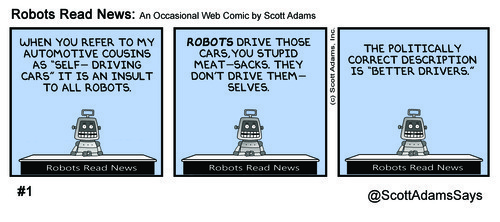
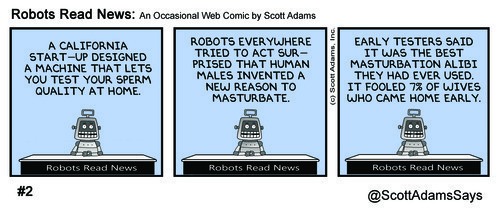
The home sperm test is a real thing, coming to a store near you if all goes well. (I am one of the smaller investors in the start-up. Seems like a huge leap for the economics and convenience of fertility testing.) Read more at Tamra Teig’s Berkeley Start-up Review.
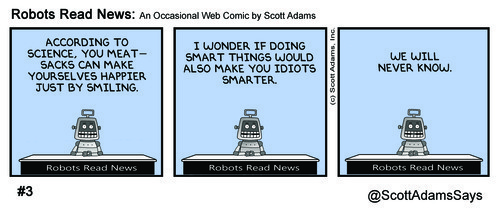
Is smiling always a good idea when it comes to your career? Vivian Giang has good news for pessimists even though they were not expecting any.
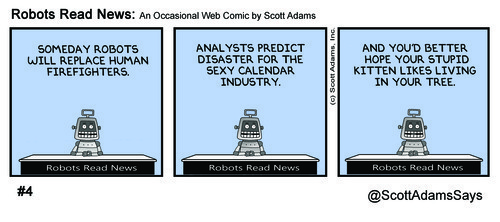
Bipedal humanoid robot firefighters are under development now. See Paul Worthington’s Top Tech for that spooky story and more in tech.
And let me know which of the Robot strips you liked, if any. That helps me triangulate on the robot’s best voice. I don’t have a goal for the strip. Developing it is a system :-) I’m learning as I go.
Scott Adams
Dilbert on Facebook
@ScottAdamsSays (my dangerous tweets)
@Dilbert_Daily (Dilbert-related tweets)
My book on success: ”I feel the best I have ever felt after reading a book.” - Puget Sound Paralegal (Amazon 5-star review Feb 20, 2015)
February 19, 2015
Introducing New Writers!
This might be the most exciting day in the history of Dilbert.com. I am delighted to introduce three new writers who will be blogging on these pages. Check them out:
Vivian Giang will be debunking myths about success (my favorite!) and other topics of interest.
Bio: Vivian Giang is a freelance journalist who covers organizational psychology, leadership, gender issues, and whatever else she finds interesting for Fast Company, Marie Claire, Fortune, Slate, among others.
Twitter: @vivian_giang
LinkedIn: Profile

Read Vivian Giang’s blog here.
Top Tech - by Paul Worthington
A daily digest of carefully curated news on the most interesting or important innovations in technology, by Paul Worthington. Look for 1-3 briefs every weekday.
Bio: Paul Worthington is a technology reporter and consultant, specializing in photography and digital imaging. He started at InfoWorld in 1989. He now hosts the annual Future Imaging Summit, and initiated the new imaging industry Visionary Awards in 2015.
Paul reports on photography here, and is on Twitter @PaulRobertW.

Read Top Tech here.
Berkeley Start-Up Review - By Tamra Teig
Tamra Teig will spotlight the most interesting start-ups that have some connection to UC Berkeley. Berkeley is second only to Stanford in the number of start-ups coming from alums. You’ll see some fascinating companies in the spotlight.
I earned my MBA from the Haas School of Business at UC Berkeley many moons ago, and I’m involved with the Berkeley Angel Network, so I have some connections to help Tamra find the interesting stories.
Bio: Tamra Teig has a degree in journalism and has been a writer and marketing communications consultant for over 20 years. While her earlier work was focused on magazine and newspaper features and newsletters, the majority of her career has been devoted to business development through corporate communications and digital marketing content.

Read the Berkeley Start-Up Review here.
Each of these blogs will evolve over time based on reader responses. I would love to hear your comments.
By way of background, several months ago I offered to make space available on Dilbert.com for other artists. I got more submissions than I expected. These are the three writers that I think fit best with the audience here. If this works out, I will be looking to grow the idea.
What do you think?
Quick links:
Vivian Giang’s BlogTop Tech
Berkeley Start-Up Review
Scott
February 18, 2015
How Far in Advance do Cartoonists Work?
People always wonder how far in advance I work because Dilbert sometimes matches the headlines. Take this week: The Dilbert.com site was attacked by foreign hackers who launched multiple DDoS attacks. By coincidence, this week’s Dilbert strips are about Elbonian hackers breaking into Dilbert’s company network.
If you didn’t recognize the real source of the Dilbert strips this week as the alleged North Korean hack on Sony, you might think I created this comic series based on my experience this week. One of the things I learned as a cartoonist is that the news doesn’t actually change. I can do a comic on a current event in June and be confident the news will still be similar in November. Sometimes the names and details change, but the general topics in the news stay the same.
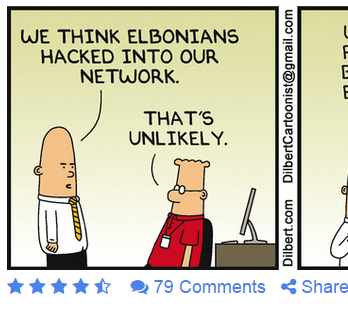
And the effect is weirder than you imagine. Obviously there will still be the same wars and political battles next year as this year. But if the media picks up a story about some celebrity sticking a ferret up his ass you can be sure there will be seven more stories of the same nature before the end of the year. The news follows themes when certain types of stories get popular. When I see a theme developing, I feel safe assuming it will be in the news in a few months.
The comic I create today will run April 20th. If it were a Sunday strip my syndication partners would need more lead time for production and printing, so the next one I draw will be for May 17th. My internal deadlines are far tighter because the strip needs time for editing, coloring, and distribution to clients.
Anyway, I think you’ll enjoy the Elbonian hacking series. It starts with this one.
Scott Adams
@ScottAdamsSays (my dangerous tweets)
Newest Dilbert Book
@Dilbert_Daily (Dilbert-related tweets)
My start-up
My book on success: “Bloody brillian!” - Rajat Desikan (Amazon 5-star review Feb 17, 2015)
February 17, 2015
The Best Lifestyle Might be the Cheapest Too
If you were to build a city from scratch, using current technology, what would it cost to live there? I think it would be nearly free if you did it right.
This is a big deal because people aren’t saving enough for retirement, and many folks are underemployed. If the economy can’t generate enough money for everyone to pay for a quality lifestyle today, perhaps we can approach it from the other direction and lower the cost of living.
Consider energy costs. We already know how to build homes that use zero net energy. So that budget line goes to zero if you build a city from scratch. Every roof will be intelligently oriented to the sun, and every energy trick will be used in the construction of the homes. (I will talk about the capital outlay for solar panels and whatnot later.)
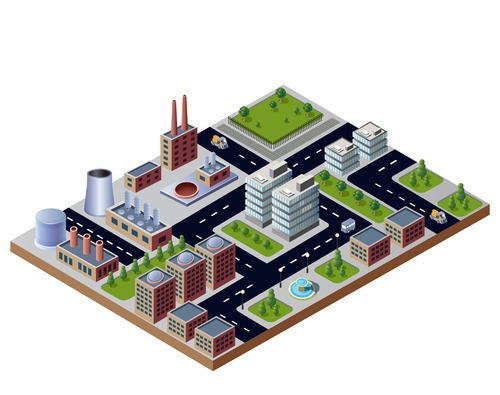
I can imagine a city built around communal farming in which all the food is essentially free. Imagine every home with a greenhouse. All you grow is one crop in your home, all year, and the Internet provides an easy sharing system as well as a way to divide up the crops in a logical way. I share my cucumbers and in return get whatever I need from the other neighbors’ crops via an organized ongoing sharing arrangement. My guess is that using the waste water (treated) and excess heat from the home you could grow food economically in greenhouses. If you grow more than you eat, the excess is sold in neighboring towns, and that provides enough money for you to buy condiments, sauces, and stuff you can’t grow at home.
Medical costs will never go to zero, but recent advances in medical testing technology (which I have seen up close in start-up pitches) will drive the costs of routine medical services down by 80% over time. That’s my guess, based on the several pitches I have seen.
Now add Big Data to the mix and the ability to catch problems early (when they are inexpensive to treat) is suddenly tremendous.
Now add IBM’s Watson technology (artificial intelligence) to the medical system and you will be able to describe your symptoms to your phone and get better-than-human-doctor diagnoses right away. (Way better. Won’t even be close.) So doctor visits will become largely unnecessary except for emergency room visits, major surgeries, and end-of-life stuff.

Speaking of end-of-life, assume doctor-assisted-suicide is legal by the time this city is built. I plan to make sure that happens in California on the next vote. Other states will follow. In this imagined future you can remove much of the unnecessary costs of the cruel final days of life that are the bulk of medical expenses.
Now assume the city of the future has exercise facilities nearby for everyone, and the city is designed to promote healthy living. Everyone would be walking, swimming, biking, and working out. That should reduce healthcare costs.
Now imagine that because everyone is growing healthy food in their own greenhouses, the diet of this new city is spectacular. You’d have to make sure every home had a smoothie-maker for protein shakes. And let’s say you can buy meat from the outside if you want it, so no one is deprived. But the meat-free options will improve from the sawdust and tofu tastes you imagine now to something much more enjoyable over time. Healthy eaters who associate with other healthy eaters share tricks for making healthy food taste amazing.
Now assume the homes are organized such that they share a common center “grassy” area that is actually artificial turf so you don’t need water and mowing. Every home opens up to the common center, which has security cameras, WiFi, shady areas, dog bathroom areas, and more. This central lawn creates a natural “family” of folks drawn to the common area each evening for fun and recreation. This arrangement exists in some communities and folks rave about the lifestyle, as dogs and kids roam freely from home to home encircling the common open area.

That sort of home configuration takes care of your childcare needs, your pet care needs, and lots of other things that a large “family” handles easily. The neighborhood would be Internet-connected so it would be easy to find someone to watch your kid or dog if needed, for free. My neighborhood is already connected by an email group, so if someone sees a suspicious activity, for example, the entire neighborhood is alerted in minutes.
I assume that someday online education will be far superior to the go-to-school model. Online education improves every year while the classroom experience has started to plateau. Someday every home will have what I call an immersion room, which is a small room with video walls so you can immerse yourself in history, or other studies, and also visit other places without leaving home. (Great for senior citizens especially.) So the cost of education will drop to zero as physical schools become less necessary.
When anyone can learn any skill at home, and any job opening is easy to find online, the unemployment rate should be low. And given the low cost of daily living, folks can afford to take a year off to retool and learn new skills.
The repair and maintenance costs of homes can drop to nearly zero if you design homes from the start to accomplish that goal. You start by using common windows, doors, fixtures, and mechanical systems from a fixed set of choices. That means you always have the right replacement part nearby. Everyone has the same AC units, same Internet routers, and so on. If something breaks, a service guy swaps it out in an hour. Or do it yourself. If you start from scratch to make your homes maintenance-free, you can get close. You would have homes that never need paint, with floors and roofs that last hundreds of years, and so on.
Today it costs a lot to build a home, but most of that cost is in the inefficiency of the process. In the future, homes will be designed to the last detail using CAD, and factory-cut materials of the right size will appear on the job site as a snap-together kit with instructions printed on each part. I could write a book on this topic, but the bottom line is that home construction is about 80% higher than it needs to be even with current technology.
The new city would be built on cheap land, by design, so land costs would be minimal. Construction costs for a better-than-today condo-sized home would probably be below $75,000 apiece. Amortized over 15 years the payments are tiny. And after the 15th year there is no mortgage at all. (The mortgage expense includes the solar panels, greenhouses, etc.)
Transportation would be cheap in this new city. Individually-owned automobiles would be banned. Public transportation would be on-demand and summoned by app (like Uber).
And the self-driving cars would be cheap to build. Once human drivers are out of the picture you can remove all of the safety features because accidents won’t happen. And you only summon a self-driving car that is the size you need. There is no reason to drag an empty back seat and empty trunk everywhere you go. And if you imagine underground roads, the cars don’t need to be weather-proof. And your sound system is your phone, so the car just needs speakers and BlueTooth. Considering all of that, self-driving cars might someday cost $5,000 apiece, and that expense would be shared across several users on average. And imagine the cars are electric, and the city produces its own electricity. Your transportation budget for the entire family might be $200 per month within the city limits.
The cost of garbage service could drop to nearly zero if homes are designed with that goal in mind. Your food garbage would go back to the greenhouse as mulch. You wouldn’t have much processed food in this city, so no cans and bottles to discard. And let’s say you ban the postal service from this new city because all they do is deliver garbage anyway. (All bills will be online.) And let’s say if you do accumulate a bag of garbage you can just summon a garbage vehicle to meet you at the curb using the same app you use for other vehicles. By the time you walk to the curb, the vehicle pulls up, and you toss the bag in.
I think a properly-designed city could eliminate 80% of daily living expenses while providing a quality of life far beyond what we experience today. And I think this future will have to happen because the only other alternative is an aggressive transfer of wealth from the rich to the poor by force of law. I don’t see that happening.
Scott Adams
@ScottAdamsSays (my dangerous tweets)
My book on success: “The best book on self-help ever.” - Frank (5-star Amazon review)
Scott Adams's Blog
- Scott Adams's profile
- 1258 followers



